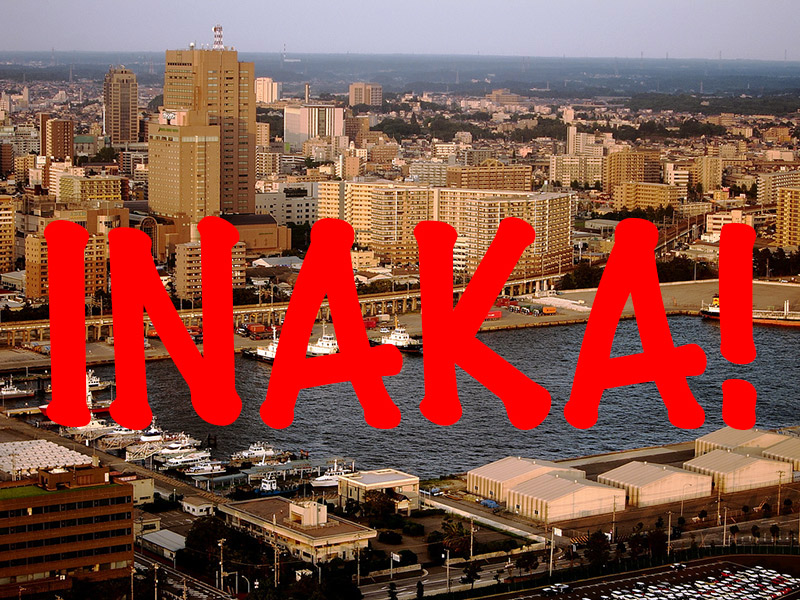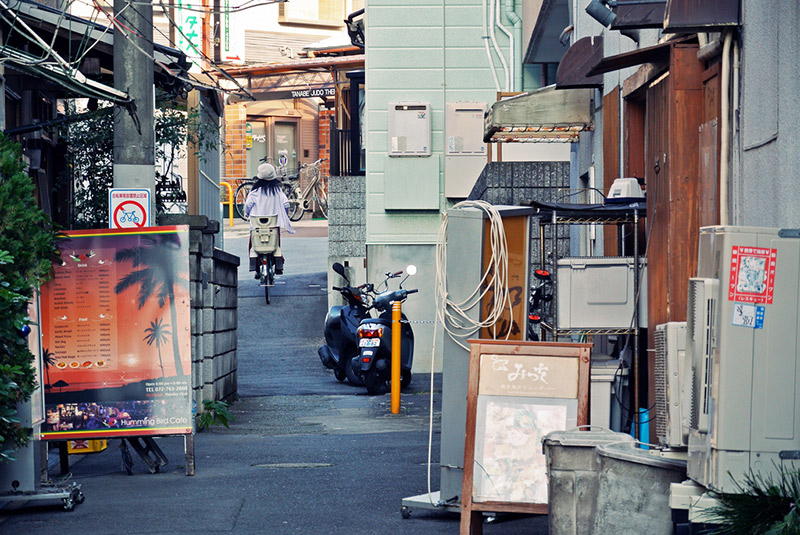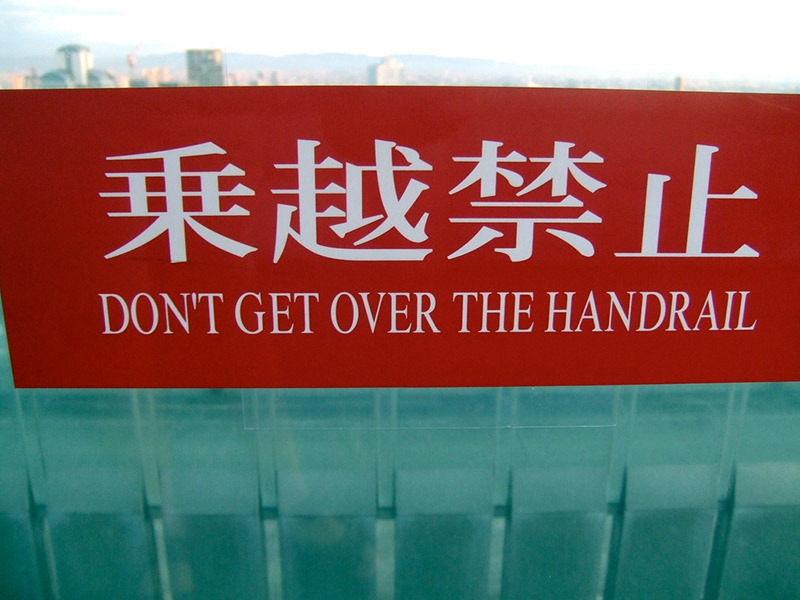My mouth was hanging open and I know I was being rude, but it was really hard to pull myself together. The woman I was speaking with was from one of the top Japanese Universities. She has had international relationships, traveled the world, and done work that most foreign anime fans would kill to see. Someone with her experiences, to me, should be open-minded about other cultures and lifestyles. Just the same, I can't help but to be bothered by what she said: "I feel like anything outside Tokyo's 23 wards is inaka."
Most of what you read about Japan and Japanese culture will come from people living in Tokyo. Some of it comes from people in Osaka, Kyoto, or sometimes Okinawa, since the base is there. But in general, Tokyo is seen as the center of the Japanese world.
While people say my new Japanese hometown is inaka, or "countryside," I can walk to several malls from my house, take a free shuttle to the outskirts of town for even more shopping, and walk by a few schools on the way to work. My town even has its own line from Tokyo that comes by every thirty minutes or so. To me, this sounds like a city but to others, this is a countryside town.
Anything Outside the 23 Wards is Inaka

My companion's quote from the start of the article is one reason why some Japanese people, both inside and outside of Tokyo, look down on the Tokyo citizens. This isn't a random saying. I've heard it several times and every time I've brought it up to people who have talked about Tokyo being "different" from the rest of the country, people sort of shrug their shoulders and say, "That's Tokyo."
Now, to be clear, "the 23 wards" is specifically the 23 special wards (tokubetsu ku). Looking over that list might seem a bit funny, since you'll notice Chiba, home of Tokyo Disneyland, is not in that list. That's right! Some people think Disneyland is out in the "inaka." In California, Disneyland's practically considered it's own city. It was at this point I had to start asking Japanese people an important question: "What does inaka mean?"
Often, people usually just use what they read in the dictionary, but I learned fast that "countryside" in American English is much different than in Japanese English. For me, countryside means farms. Countryside is driving to see your closest neighbor, riding tractors for work and pleasure, and being able to immediately tell who's from your town just by looking at them.
When I say this to Japanese people and ask them to explain inaka, the joke is always the same: "Inaka is anything outside of Tokyo." Osaka and Kyoto, for many, aren't inaka, but Sapporo, which is one of the few parts of the country where this legendary thing called "insulated housing" exists, is inaka. Okinawa, in general, is kind of seen as "not Japanese" mainly due to the military base and the fact that the people there are viewed as different (you'll hear about "Okinawa time" if anyone wants to joke about being an hour late). In fact, one person I spoke with said that most people, in general, can refer to their hometown as their inaka, but a person from Tokyo would never dare to do this.
I bring this up not only to make a point about the way Japanese people seem to feel about the word inaka, but to illustrate that Japanese people might think you are from the inaka.
Despite the fact that the cheapest houses in my hometown in America are over a million dollars, have Malibu-priced clothing stores, and a golf course built by Donald Trump, I was assured that, because there is one convenience store, no train, no game center, and no bars, my city surely must be inaka.
Everyday Life in a City that isn't Tokyo, Osaka, or Kyoto

So you might be wondering how "bad" it really is out here. Truthfully, I'm living in a city, at least by American standards. Great bus and train systems, tons of malls and movie theaters, some of the major stores people visit Tokyo to see, game centers, golfing… and a few rice paddies. Not many, but there are some. Imagine a fashionable mall, famous manga store, well-respected school with a strong baseball team, and major supermarket, all within walking distance, with maybe one field of rice. Honestly, the place is so city that I don't think I would willingly eat any rice that grew in that field. I swear, it's in front of a bus stop.
I can still buy some imported stuff, but it's expensive. Raw peanuts and walnuts, canned pumpkin, oatmeal, peanut butter, buffalo wing sauce… I've seen tons of stuff from home, but not at the prices I'd be willing to pay unless desperate (I'm looking at you, pumpkin!). Clothes in my size, however, require a trip to Tokyo or other non-_inaka_ city, except for when I go bowling. Yes, I can get shoes in my size at the alley.
Oddly enough, after having lost weight, I've had a really hard time finding an affordable belt in my size (I'm cheap). The pants are often too short here, but the belts, oddly enough, tend to be too large! If you're a big guy or gal, you can get a decent belt here, even at a 100 yen shop.
For food, while people complain about the price of vegetables and fruits, you just have to make due with the local foods rather than try to rely on what you used to eat. Onions, especially nira, a grass-like green onion, are rather inexpensive. Potatoes aren't that bad for the small sizes you can buy, garlic is well priced, and, for fruit, look out for mikan (it's very similar to a tangerine) in the winter and apples in the fall.
However, one really big difference is that non-Asian foreigners really stand out. If gaikokujin in Tokyo complain about it, consider it at least twice as bad outside of the city. I'll discuss this more in the future, but oddly enough, not every foreigner out here is a native English speaker.
Now, to be blunt: outside the major cities, foreigners are not super common and the traditional Japanese politeness may start to go out the window. My second month in Japan, an old Japanese man rode up to me on his bike, jumped off, and started staring at me, just inches from my chest (he wasn't very tall). This was in the middle of a popular shopping street that always has a few black guys standing outside their American fashion shop, so I didn't think I'd be that interesting. The guy was amazed, and said something I didn't fully catch, so my friend translated it: "He says, 'Is your beard real?'"
The beard wasn't the end of it. In bathrooms, both young children and old men will lean over to check out my, ah, "foreign member." Some don't even hide their curiosity, which is why I am completely uncomfortable going to any onsen other than the ones just for your feet. It's not as bad as the "bigu dikku" comments black men have to endure (at least, I imagine it's not), but it's still rather uncomfortable.
Any stories you've heard about kids and a certain "game" involving the thrusting of fingers towards the anus are real. I've only had one kid try to pull it on me, and it was a little girl. Apparently she had never tried to do that with the Japanese teachers, but the teachers laughed when she tried it with me. I try to be open-minded about different cultures, but having a child do that to a grown man in public, especially a teacher, just doesn't seem "okay" to me. It's funny looking back at it now, but at the time, I was pretty surprised at the "kids will be kids" reaction, rather than the "Sweet Siddhartha, what in Buddha's name do you think you're doing!?" reaction I expected from such a bold move.
For me, what's more interesting is how, if you're a foreigner, anyone with you becomes foreign, unless you're approached while they're speaking Japanese. I've had Japanese friends accused of being foreigners by little Japanese kids who just walked up to us and said "Gai(koku)jin(foreigner (foreign person))?" It's not totally bad though, because then the kids try the very little English they know and will ask the Japanese person for some help. It's a great time to prep the young generation for dealing with foreigners in perhaps a more respectable manner the next time they bump into one. What's funnier is when I'm with a non-native Asian person who speaks little to no Japanese while I do some very basic translating for them. More on that later though.
There is a lot of good that comes with the not-so-good. People are usually friendly. Even when I'm "scary", people will warm up to me if given enough time. Kids and old people I walk by everyday say "hi" or at least greet me. Store owners I can barely talk to and whose stores I barely shop at will greet me. Some even throw in small gifts from time to time (thanks for the little scoops of potato-salad, yakitori-ya no obaachan!). As an introvert, the extra attention isn't exactly desired but, when I'm having a rough day or if I'm starting to question why I stay in this country, the positive aspects and seeing people grow a little through interaction can really make my day.
Japanese People Don't Speak English, But They Understand It

Despite the fact that very few people spoke English to me when I first came to Tokyo ten years ago, I remember getting a strong feeling Japanese people understood my English. For that matter, they understood the groups of Europeans who sat around in cafes and slammed Japanese culture, turning noisy cafes dead silent.
If there is one thing I want people to take away from this article, both for those in Tokyo and the inaka, it is "don't slam Japan in English!" If you must, do it in Spanish, German, Mandarin, Arabic, or any other language but English. English is pretty much the only foreign language Japanese people study, and it's mandatory. Japanese borrows tons of English words. You've heard seemingly random English words in J-Pop, Japanese commercials, and anime, right? Even in the inaka, English is scattered here and there, from tourist attractions to school club posters for the Tea Ceremony club. Japanese people may not speak a word of Japanese to you, but they've learned at least six years of English if they're an adult. They might not understand the difference between "on the computer" versus "in the computer" but they certainly understand when you say, "They're too polite!" I've heard stories from Japanese friends about foreign businessmen saying overtly sexual things about Japanese girls in their elevator thinking the girls didn't understand them. They did, and those women felt deeply ashamed by the situation. Don't be the foreigner in those stories!
Let's switch gears to something a bit more positive. I said the Japanese understand English, right? Even out here, with my poor Japanese, I can usually overcome the language barrier if I speak slowly and try switching my vocabulary. My father doesn't natively speak English, so I do have a lot of experience communicating with non-native speakers. I think patience is the real secret for adjusting and making connections.
Because Japanese people spend so much time on translating and very little time using the language, they are sometimes literally afraid to speak English. I mean shaking, almost crying, deeply-ashamed-to-try-and-communicate kind of afraid. During one instance, a grown man, upon finding out that the woman I was with was Taiwanese-American, not Japanese, and that I was the one that spoke Japanese, turned obviously pale when I spoke to him in Japanese. He never tried to respond to me, he just kept trying to speak in Japanese to the "Asian" person.
And that's one thing you'll need to get used to. While in Tokyo, Osaka, and Kyoto, Japanese people may be willing to try to use some English with you, outside, more often than not, people will simply talk to you in Japanese and hope that you can repeat their "translation trick" with their langauge. Despite how often I visit Tokyo, it's still often a surprise to me when someone replies to my Japanese in English. Out here, even with some Japanese teachers of English, I'm used to getting Japanese replies.
If the example of me being ignored in favor of my Taiwanese companion didn't reveal the next point I want to cover, than allow me to be frank: even when Japanese people understand you, in English or Japanese, Japanese people may sometimes ignore you or your request if it conflicts with their expectations. Not just in everyday life, but at work as well, and it will primarily be based on what's expected. For example, during a self introduction, I had a teacher translate that "I hate McDonald's" into "daisuki" (love) McDonald's. I even said it in Japanese, but it wasn't until I explained that I never eat there, I think the food is mazui (unappetizing), and that would rather cook for myself that the teacher believed I knew what I was saying. This has happened when I've only asked for one bag for all my souvenirs instead of one for each item, that I didn't need chopsticks for take-out, or that I didn't need a fork for my katsu. It happens kind of often in Tokyo, Osaka, and Kyoto, but much more often in the inaka. At first, some Japanese co-workers and friends who are good at English didn't quite believe my experience, but upon witnessing it, became very protective and supportive of me. It can be difficult to keep learning Japanese when your correct Japanese produces opposite results.
I haven't lived everywhere in Japan. Some people will have different experiences than me, or find what I said to be the complete opposite of their experience. And that's fine! I encourage people to share their adventures in the comments. This is, however, a collection of what I've found to be the most common situations for myself and others from various locations around Japan.
Tokyo may have a lot more imported goods, stylish shops, theme parks, and foreigner-acclimated locals, but life in the inaka is still good. Just different. Foreigners can make a much bigger impact, exposing both young and old to different cultures and slowly showing them that we don't all fit certain stereotypes. If you're trying to learn Japanese, living in the inaka will force you into situations where your Japanese will improve. Japanese locals won't always believe you know what you're talking about, but it's better than in Tokyo where, no matter how hard to try to only speak Japanese, they keep replying in English. And your inaka experiences will at least make for some decent stories. After all, Japan is much more than what many travelers experience in Tokyo and some of the "smaller" cities.
